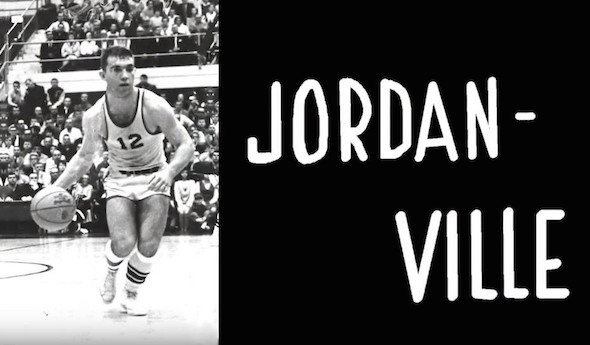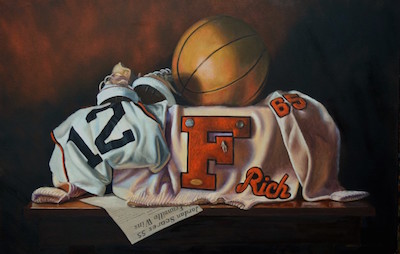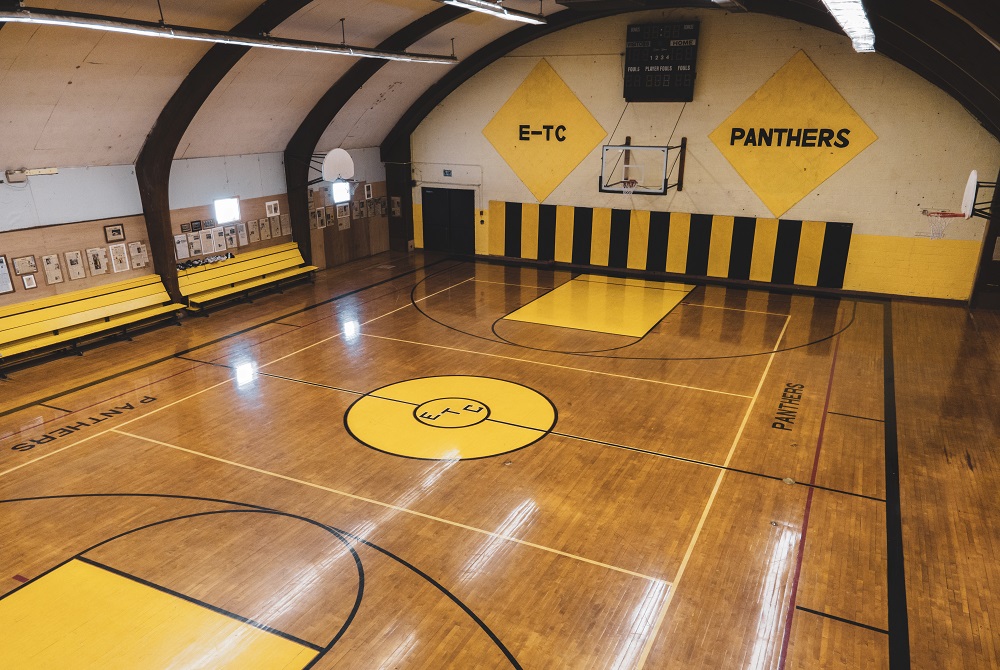
Film Fills In Picture of 'Fennville Flash'
By
Ron Pesch
MHSAA historian
December 28, 2017
We’ve been here before, but not in this way.
The last time was for a retrospective, covering one of the most impressive and awe-inspiring prep careers in Michigan high school history. That time was in print, and included a handful of still images that tried to illustrate the unbelievable.
But this time, the story is in documentary form. It’s woven together from grainy, scratched, faded silent film, a format of capturing memories familiar to thousands of people from generations past, as well as a series of modern-day high-resolution interviews.
Here, the basketball life of the athlete known as the “Fennville Flash” delivers on many levels. Yes, there is a Richie Jordan.
JordanVille, a documentary by John Mooy & Anne Colton, recalls a time when legend spread via word of mouth, newsprint and AM radio.
While it’s hard to comprehend for many today, the exploits of our athletic heroes were formed by “poets in the press box” who sat with pencil and paper, a typewriter, a microphone or a telephone, and described to their audience what they witnessed. On the receiving end, readers and listeners conjured up visualizations based on the facts, phrases and superlatives designed to create an image.
“Traveling left to right on your radio dial” helped listeners feel they were a member of the crowd, seated in the stands, in on the action and a witness to the mayhem. “Packed to the rafters,” reminded fans the importance of what was happening. An exciting game, presented by those with skill, created an event you longed to see. If a broadcast couldn’t be picked up on a transistor or tube radio, the final result might not be known, at the earliest, until the following day’s newspaper arrived.
I’ve told Jordan’s story via the MHSAA before; how he latched on to athletic training, weights and repetition to mold himself into a well-rounded athlete, able to leap to heights unexpected for a kid with a 5-foot-7 frame. The tales of his unfathomable accomplishments slowly leaked beyond the city limits of Fennville into Kalamazoo and greater Southwestern Michigan, then to Detroit. When Detroit Free Press writer Hal Schram relayed Jordan’s feats, the secret traveled across the state and beyond its drawn borders.
From there the legend of Jordan’s accomplishments grew. In Fennville, as in many small towns across the country, the city shut down when a game was played. The Jordan story was so enticing that thousands would travel vast distances to see him play with their own eyes. Today, his single season scoring average of 44.4 points per game during the 1964-65 campaign still remains the top mark in the MHSAA record book.
 JordanVille runs just shy of a half hour. Contained within is insight into the athlete that is challenging to relay in print form. Thanks to access to home movies and a series of interviews with Jordan, former teammates, past opponents and his high school coach, the determination, dedication and drive of a kid who wouldn’t let physical size be a deterrent from achievement radiates from the screen. On display is small town America at its finest, and perspective formed over 50+ years.
JordanVille runs just shy of a half hour. Contained within is insight into the athlete that is challenging to relay in print form. Thanks to access to home movies and a series of interviews with Jordan, former teammates, past opponents and his high school coach, the determination, dedication and drive of a kid who wouldn’t let physical size be a deterrent from achievement radiates from the screen. On display is small town America at its finest, and perspective formed over 50+ years.
For Mooy, it completes a filmmaking journey started six years ago. But the story of Jordan, in his eyes, date back to his school days. Mooy first heard about Jordan as a 7th-grader from a math teacher. A second-team all-St. Joseph Valley League selection, Mooy played at Marcellus High School and scrimmaged against Jordan and the Fennville Blackhawks.
He couldn’t believe his eyes.
“Everyone wanted to see this kid play,” said Mooy in 2011. “He was the first high school player I saw sign an autograph.
Today, with the interviews complete, and the film ready for viewing, Mooy sees more than just a sports story:
“With the benefit of years now passed, I look at the Rich Jordan story with a new respect. JordanVille created a place that was welcoming no matter who you were, or what color your skin happened to be. It was the 1960s. Rich was growing up Jewish, the Civil Rights Movement was in full swing, and the Vietnam War was on everyone's mind. And in Fennville, Michigan, from 1961 to 1965, the Jordan high school years, there were lessons beyond sports being learned by everyone that would last a lifetime. The Jordan household, under the guidance of (his parents) Tuffy and Sylvia Jordan, is where the story begins."
The film speaks of a time that has departed. Competition for our attention was less focused; phones hung on walls or sat on tabletops, communities were tighter, the training table featured peanut butter and chocolate milk instead of protein powder. A city could easily be renamed for a day.
The film also reminds us that those days were far from perfect.
If all goes as planned, the public will see the finished product come the flip of the calendar. In West Michigan, JordanVille is scheduled to show on New Year’s Day at 6 p.m. on WGVU, and will repeat on WGVU-Life at 7:30 p.m., Friday, Jan. 5.
Seek it out, and spread the word, just like in days of old.
 Ron Pesch has taken an active role in researching the history of MHSAA events since 1985 and began writing for MHSAA Finals programs in 1986, adding additional features and "flashbacks" in 1992. He inherited the title of MHSAA historian from the late Dick Kishpaugh following the 1993-94 school year, and resides in Muskegon. Contact him at [email protected] with ideas for historical articles.
Ron Pesch has taken an active role in researching the history of MHSAA events since 1985 and began writing for MHSAA Finals programs in 1986, adding additional features and "flashbacks" in 1992. He inherited the title of MHSAA historian from the late Dick Kishpaugh following the 1993-94 school year, and resides in Muskegon. Contact him at [email protected] with ideas for historical articles.
PHOTOS: (Top) Richie Jordan runs Fennville's offense during his thrilling high school career in the 1960s. (Middle) Jordan memorabilia, as captured by Bill Williams.

Ewen-Trout Creek Grad Rekindles Memories of 'The Barn' in 8-Part Docu-Series
By
Jon Ross
MHSAA Director of Broadcast Properties
February 7, 2023
It was known as “The Barn.” And it was home to the 1972 Class D boys basketball champion, the 1973 Class D girls basketball champion and the 1982 Class D boys basketball runners-up.
The Upper Peninsula’s all-time winningest female basketball coach coached at The Barn, as did the Upper Peninsula’s all-time winningest male basketball coach. And when Ewen-Trout Creek advanced to the 2022 Division 4 Final, its roster was littered with names from E-TC’s past:
► Leading scorer Jaden Borseth’s dad played on the 1995 team that advanced to the Class D Regional Final.
► Kelsey Jilek’s dad played on the 1992 team.
► Brendan Polkky’s dad is currently an assistant coach for E-TC and played on the 1991 team that also advanced to the Class D Regional Final.
► Caden Besonen’s dad Dave starred on the 1982 state runner-up team. Caden’s uncle Brad is the E-TC head coach. And Brad’s dad, Bryan, played on the 1972 championship team.
The Barn hosted its final E-TC game in 1998 and is now owned by Gary Fors, who also played on the 1972 title team. It’s now a community gym of sorts, and many members of the 2022 team worked out there growing up.
E-TC grad Kristin Ojaniemi – an award-winning documentary film maker and photographer, and the TV producer and host of “Discovering” for 906 Outdoors – is taking a look at the history of “The Barn” as well as its ties to the 2022 team in an eight-part series called “Born in the Barn.” The first two parts are complete, and the entire series will be available to view at KristinOjaniemi.com.
I had a chance to ask Ojaniemi about the project and why it’s so special to so many people.
Kristin, how did you come up with the idea to document the history of The Barn?
The idea to document the history of The Barn and E-TC basketball developed over time. Five years ago I had a conversation with Dan Truckey of the Beaumier Heritage Center at Northern Michigan University, and when I told him where I went to high school, we got on the topic of basketball and how E-TC was a powerhouse and that "there must be something in the water" here. Fast forward to 2021, and I saw on Facebook some photos of the inside of The Barn and all the newspapers Gary Fors had lined the walls with, sort of like a museum. February of 2022 I realized it was 50 years since the 1972 boys state championship and 40 years since the 1982 state runner-up seasons. I like anniversaries in history and thought it would be the perfect time to do some sort of documentary. Originally my focus was Gary and The Barn and more of the 70s and 80s boys and girls seasons, but once the 2022 boys started advancing in the tournament, that obviously changed.
What did the 2022 team’s run to the Finals mean to the players from the ’72 and ’82 teams?
The 2022 run meant a lot to the players of '72 and '82 because many of those boys are sons, grandsons, great-nephews of those guys. Bryan Besonen of the '72 team is coach Brad Besonen's father. Many of them traveled to every tournament game, and watching the 2022 season brought back memories of their glory days. They're definitely very proud of the 2022 team and the tradition that E-TC has continued through the years. Watching them watch those games was just as fun as watching the court. The 2022 team's run to the Finals meant a lot to the whole community. So many others traveled all the way to Lansing to cheer them on, and there is just a ton of pride in this team. I went to the banner unveiling a few weeks ago, and it was a huge crowd at the game to watch those few seconds of history being made.
What is your history with The Barn?
I graduated from Ewen-Trout Creek in 2000. We were in the "new" school then, but I spent four years – seventh-10th grade – in the "old" school, which had so much more character than the new one! I did play basketball seventh-10th – junior high and junior varsity. I was a benchwarmer most of those years. I loved the game but didn't spend any time offseason playing or practicing like others. I was also a cheerleader those years too, and if you look closely at one of the newspaper photos from the last game in the Barn, I'm in the background. Ha ha! This was back when girls basketball was in the fall and boys in the winter, so you could do both. As others in the documentary mention, The Barn was also where you hung out at lunch, and gym class was in there, and homecoming activities. Filming in there brought back a lot of memories.
What did Nancy Osier (U.P.’s winningest female basketball coach) and Tom Caudill (U.P.’s winningest male basketball coach) think made The Barn such a difficult place for opposing teams to play?
Thinking back to Nancy and Tom's interviews, I think the difficulty for other teams really boiled down to the atmosphere and the E-TC fans and that intimidation factor. E-TC had the ultimate homecourt advantage in The Barn, and their players spent hours upon hours practicing on that floor. And the school's history and tradition of rarely losing a home game is also intimidating.
There’s obviously a lot of family ties from the 2022 team to earlier teams – and it was the 50th anniversary of the ’72 win – did they feel more pressure along the way because of that?
I think the 2022 boys had this feeling that they wanted to one-up their grandfathers/fathers. I think it was Kelsey Jilek that told his grandfather, George Hardes (1972), that they had one more game in their schedule so they could potentially have a better record if they won all their games. But none of them came out and mentioned that the anniversary put pressure on them, but I’m sure it was there. They set out to win it all from the beginning and put the work in, and it paid off. There are a lot of parallels in these winning seasons.
When will the next part of the series be released?
Part 3, I should have done by the end of February. Part 3 focuses on the 1973 girls state champs; 1973 was the first year there was a state final for girls basketball after Title IX, and E-TC won the Class D title. And then I plan to release each part every two months with the final, Part 8, done by the end of 2023. This is just a fun hobby/personal project, I guess you'd say, so I only have so much time to dedicate to it after all my "real" work.
(PHOTOS of "The Barn" courtesy of Kristin Ojaniemi.)

